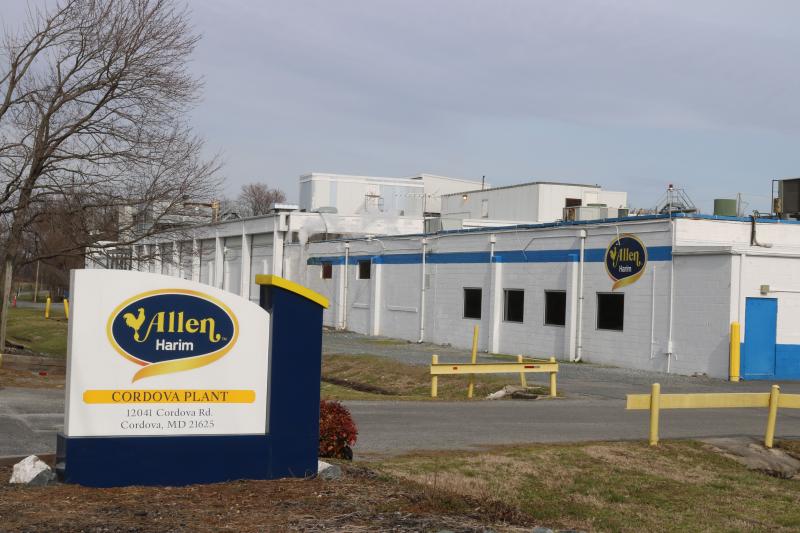Allen Harim to consolidate poultry processing in Harbeson
Allen Harim Foods LLC announced March 8 that it will be closing its processing plant in Cordova, Md., this summer and moving processing equipment to its Harbeson facility.
The closure will affect about 300 employees, who will be offered jobs at the company's processing plant in Harbeson, the feed mill and truck shop in Seaford and the hatchery in Dagsboro.
“We are very grateful to our Cordova-based employees, some of whom have been with us for a very long time,” Allen Harim CEO Steve Evans said in a press release. “We will do everything possible to help them continue their employment with us, or to help them find other opportunities.”
The 71-year-old, 110,000-square-foot Cordova plant is expected to close in July. Processing equipment will be moved to Harbeson in the coming months, a press release stated. The truck maintenance operations located in Cordova will be moved to the Seaford facility.
Evans said in a phone interview the company may sell or lease the Cordova property, but that decision has not been made.
Employees were notified of the consolidation March 8, and company officials said there are plans to work with state and local officials to to help former Cordova employees. An on-site career center is planned to help employees during the transition.
Officials said closing the Maryland plant resulted from a shift in the company's products and efforts to improve efficiency.
“We've worked very hard over the past three years to take this company in a new and focused direction and to return it to a profitable operation that will continue to grow and employ people on Delmarva,” Evans said. “We are following a strategic plan that achieves our goal of a sustainable company moving forward.”
The plan includes a $35 million expansion at the Harbeson facility, featuring upgrades to the wastewater treatment plant, restrooms, cafeteria, shipping and receiving, production lines, equipment and the addition of a water-reuse system. Those expansions will allow the plant to increase production from about 1.1 million chickens per week to about 1.8 million per week, Evans said.
All chickens processed in Harbeson are vegetarian-fed and most are not treated with antibiotics. About half of the chickens processed are grown on Maryland farms, with the other half grown on Delaware farms; chicken production locations will not change, he said.
The state approved the first phase of construction for the improvements and granted more than $11 million in low-interest loans for the wastewater expansions. Evans said in an earlier interview that plant upgrades and the new water-reuse system will reduce nutrients flowing into Beaverdam Creek, which flows into the Broadkill River and then the Delaware Bay. State officials said a public hearing on a permit for the second phase of construction is pending but not yet scheduled.
Neighbors and environmental advocates recently criticized Allen Harim's Harbeson operations and plans, alleging the company is polluting local waterways. At a community meeting in Milton in February, Maria Payan of the Socially Responsible Agriculture Project shared data that showed the plant has exceeded pollution standards but has never been officially cited for any violations.
“So, they're closing down a 71-year-old plant and moving it to a 100-year-old plant,” she said after hearing the news. “This is interesting because this is the same company that came in saying they were going to invest $100 million into this top-of-the line, state-of-the-art water-treatment system and provide 700 jobs, and so far all we've seen is millions of dollars loaned from the state at 2 percent interest, and there's another 300 jobs gone.”
State Department of Natural Resources and Environmental Control spokesman Michael Globetti refuted claims that the Harbeson facility has violated its permit limitations. Globetti said a permit allowing the plant to discharge treated wastewater and stormwater into the Beaverdam Creek was administratively extended after it expired in 2011.
“Through no fault of the permittee, the new permit was not issued until after the permit's expiration date,” he said in an email. “As such, the permit terms and conditions were continued and remain in full effect.”
In a technical memo attached to the executive order reissuing the permit, officials explained the lapse in permit renewal by stating, “The simple answer is the surface water discharges section is woefully understaffed and has been working to reduce a permit backlog that has been decades in the making.”
A new 5-year permit recently was issued, effective in February 2016, replacing the expired 2011 permit. It requires the discharged wastewater and stormwater to be treated at a higher level than the previous permit.
However, Allen Harim has 42 months to comply with reductions to total nitrogen and aluminum discharge levels. The 2016 permit requires immediate reduction of nitrogen loads by about 40 percent compared to the 2011 permit allowance. Other pollutants, including phosphorous, enterococcus bacteria, and oil and grease limits, are effective immediately. At the end of the 42-month compliance schedule, Allen Harim must reduce nitrogen levels by 84 percent, compared to the previous permit allowance.
“DNREC records (including permit parameters, limitations and other permit requirements) show that overall compliance … at Allen Harim's Harbeson facility has been excellent, with a greater than 99 percent compliance rate since January 2010,” Globetti said in an email.
Allen Harim currently employes about 1,200 people at its Harbeson facility, and plans to add 250 jobs with the expansion.
Evans said he hopes about 150 employees working at the Cordova facility make the transition to Harbeson to fill those positions, but he is unsure whether that will happen. He said most of the 250 added jobs will be in processing, where employees are tasked with deboning and similar responsibilities, but some supervisors and management employees also will be moved from Cordova to Harbeson.
“It was a hard decision over the past few weeks, but it was the right thing to do,” Evans said. “The one thing we're trying to do – we live here, we sleep here, we go to the beach here, too – this organization, we're trying to do it right. We're trying to do it right, and we want to be good neighbors because we need those people to support us.”
























































